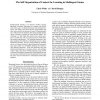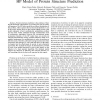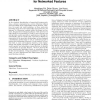390 search results - page 52 / 78 » Representing Knowledge Gaps Effectively |
AIIDE
2006
13 years 9 months ago
2006
Reinforcement learning is an effective machine learning paradigm in domains represented by compact and discrete state-action spaces. In high-dimensional and continuous domains, ti...
IJCAI
2001
13 years 9 months ago
2001
Psychological studies on teamwork have shown that an effective team often can anticipate information needs of teammates based on a shared mental model. Existing multi-agent models...
AI
2005
Springer
13 years 7 months ago
2005
Springer
Because of privacy concerns, agents may not want to reveal information that could be of use in problem solving. As a result, there are potentially important tradeoffs between main...
CEC
2011
IEEE
12 years 7 months ago
2011
IEEE
Abstract—Protein structure prediction is the problem of finding the functional conformation of a protein given only its amino uence. The HP lattice model is an abstract formulat...
CIKM
2010
Springer
13 years 5 months ago
2010
Springer
In the standard formalization of supervised learning problems, a datum is represented as a vector of features without prior knowledge about relationships among features. However, ...



